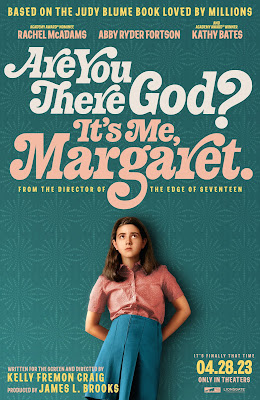Looking back, there’s a certain grim irony to the frenzied controversy that surrounded Judy Blume’s seminal 1970 young adult novel Are You There God? It’s Me, Margaret. Telling the story of 11-year-old Margaret Simon as she navigates the uncertain waters of growing up after her family moves to the New Jersey burbs, the book’s frank discussions of puberty, menstruation, and—shall we say—“bra envy” sparked the admiration of teenage readers and the ire of many of their parents. The result? In the 50+ years since its publication it has been listed by the American Library Association (ALA) as one of the most frequently challenged and censored books in America’s schools. The grim irony of it all is twofold. First, if parents in the 1970s thought this book was too explicit—and having read it I can confirm that there’s nothing more “graphic” in it than what kids might see and learn in any middle school health class—one can only imagine what they’d make of the sex in the Twilight series or the violence in The Hunger Games. And second, if all the parents who decried the book’s examination of budding teenage sexuality as sinful would look beyond the trees for the forest they’d realize that Blume’s book is a marvelously moving and surprisingly pious depiction of faith. Born to a Christian mother and a Jewish father, Margaret spends as much—if not more—time praying to God and wondering what religion might be right for her as she does boys or bras. In our modern secular society, the idea of a novel that treats personal faith as being as important to young people as puberty becoming a hit among teenagers seems unthinkable.
Now, decades later, Blume’s book has been adapted into a major motion picture. Written and directed by Kelly Fremon Craig whose previous film The Edge of Seventeen (2016) proved her deftness at handling the sensitive topics surrounding adolescence, Are You There God? It’s Me, Margaret. isn’t just a faithful adaptation of Blume’s book—although it is that. If anything, it’s the rare film version of a book that surpasses its source material. Fleshing out many of the adult characters while keeping its gaze firmly locked on Abby Ryder Fortson’s wonderful performance as Margaret, the film perfectly balances the humor and drama of Blume’s novel without being twee or preachy. Though set in 1970, the film maintains the universality of Margaret’s experiences which helped make the book so timeless—you may never have been a teenage girl praying for her first period, but almost everyone can relate to feeling like a freak over feelings that their body isn’t “developing” fast enough compared to everyone else. (The few exceptions will be glad to see that Craig maintained Blume’s subplot about one of Margaret’s classmates who got bullied and accused of being “easy” just because she developed breasts in the fourth grade.) Likewise, everyone can relate to the awkwardness of a first crush, body envy, and realizing that the friends you have might not always be the friends you’ll need down the road.
Still, it’s the film’s treatment of religion and faith that makes Are You There God? It’s Me, Margaret. so refreshing. As in the book, Margaret works through a crisis of faith as she tries to decide whether she wants to be Jewish or Christian when she gets older. She attends synagogue with her firecracker Jewish grandmother Sylvia (Kathy Bates), goes to a worship service at a black Baptist church with her school friend, and even visits a confessional at a Catholic Church during a personal crisis. But above all Margaret prays, prays, prays. She prays with an intensity that would make the Apostle Paul blush, going to God with all of her fears and hopes. She prays in times of joy and sorrow. She even prays in times of doubt when surrounded by people who make her question the very goodness and existence of God—people like her devout Christian maternal grandparents who cut contact her with mother eleven years ago when they learned she was marrying a Jewish man. Like the book, the film offers no easy answers to these difficult questions—it doesn’t try to solve the problem of faith in a God who can sometimes seem remote or absent in our lives. Instead, it’s the portrait of a relationship between Created and Creator, one where both knocks on the doors of each others’ hearts.
Are You There God? It’s Me, Margaret. is recommended for parents and young teenagers to watch together and is currently available to rent and stream on DirecTV, Google Play, Vudu, Amazon, and other streaming services. It contains frank discussions of puberty, menstruation, and teenage anatomy, but it features nothing more graphic than a diagram of a penis in a medical textbook which is briefly shown for a few seconds.

No comments:
Post a Comment